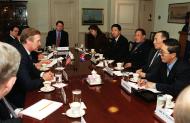Kuka päivitti Kim Jong-il?
Song Hye-rim päivitti Kim Jong-il : sta .: ään Ikäero oli 4 vuotta, 0 kuukautta ja 23 päivää.
Ko Yong-hui päivitti Kim Jong-il : sta .: ään Ikäero oli 11 vuotta, 4 kuukautta ja 10 päivää.
Kim Ok päivitti Kim Jong-il : sta .: ään Ikäero oli 23 vuotta, 6 kuukautta ja 12 päivää.
Kim Jong-il

Kim Jong Il (born Yuri Kim; 16 February 1941 or 1942 – 17 December 2011) was a North Korean politician and dictator who was the second supreme leader of North Korea from the death of his father Kim Il Sung in 1994 until his death in 2011. Posthumously, Kim Jong Il was declared Eternal General Secretary of the Workers' Party of Korea (WPK).
In the early 1980s, Kim had become the heir apparent for the leadership of North Korea, thus being established the Kim family, and he assumed important posts in party and army organizations. Kim succeeded his father and founder of North Korea, Kim Il Sung, following his death in 1994. Kim was the General Secretary of the WPK, WPK Presidium, WPK Central Military Commission, Chairman of the National Defence Commission (NDC) of North Korea and the Supreme Commander of the Korean People's Army (KPA), the fourth-largest standing army in the world.
Kim ruled North Korea as a repressive and totalitarian dictatorship. Kim assumed leadership during a period of catastrophic economic crisis amidst the dissolution of the Soviet Union, on which it was heavily dependent for trade in food and other supplies, which brought a famine. While the famine had ended by the late 1990s, food scarcity continued to be a problem throughout his tenure. Kim strengthened the role of the military by his Songun ("military-first") policies, making the army the central organizer of civil society. Kim's rule also saw tentative economic reforms, including the opening of the Kaesong Industrial Park in 2003. Under his leadership, North Korea conducted its first nuclear test in October 2006, obtaining nuclear weapons. In April 2009, North Korea's constitution was amended to refer to him and his successors as the "supreme leader of the DPRK".
The most common colloquial title given to Kim during his lifetime was "Dear Leader" to distinguish him from his father Kim Il Sung, the "Great Leader". Following Kim's failure to appear at important public events in 2008, foreign observers assumed that Kim had either fallen seriously ill or died. On 19 December 2011, the North Korean government announced that he had died two days earlier, whereupon his third son, Kim Jong Un, was promoted to a senior position in the ruling WPK and succeeded him. After his death, alongside "Eternal General Secretary" of the WPK, Kim Jong Il was declared "Eternal Chairman" of the now defunct National Defence Commission, in keeping with the tradition of establishing eternal posts for the dead members of the Kim dynasty. North Korean media also began referring to Kim as "the General" (장군 Changgun), similar to his father's posthumous designation as "the [eternal] President".
Lue lisää...Song Hye-rim
Song Hye-rim (kor. 성혜림, 1937–2002) oli pohjoiskorealainen näyttelijä ja yksi Kim Jong-ilin rakastajista sekä Kim Jong-namin äiti. Hän syntyi nykyisen Etelä-Korean alueella Changnyeongin maakunnassa.
Song meni opiskelemaan Pjongjangin elokuvakouluun, mutta lähti pois synnytettyään tytön. Hän valmistui myöhemmin ja teki ensimmäisen debyyttiroolinsa 1960. Hänestä tuli suosittu näyttelijä 1960-luvulla, ja hän esiintyi muun muassa elokuvissa Onjŏngryŏng (온정령) ja Baek Il-hong (백일홍).
Songin on ilmoitettu kuolleen 17. toukokuuta 2002. Jotkut uskovat hänen kuolleen Moskovassa.
Lue lisää...Kim Jong-il

Ko Yong-hui
Ko Yong-hui (Korean: 고용희; Korean pronunciation: [ko̞.jo̞ŋ.βwi]; 26 June 1952 – 13 August 2004), also spelled Ko Young-hee, was the mistress of North Korean supreme leader Kim Jong Il and the mother of his successor, Kim Jong Un. Within North Korea, she is only referred to by titles, such as "The Respected Mother who is the Most Faithful and Loyal 'Subject' to the Dear Leader Comrade Supreme Commander", "The Mother of Pyongyang", and "The Mother of Great Songun Korea".
Lue lisää...Kim Jong-il

Kim Ok

Kim Ok (kor. 김옥; s. 1964) on Pohjois-Korean entisen johtaja Kim Jong-ilin leski ja Kim Jong-unin äitipuoli. Hän oli diktaattorin neljäs vaimo.
Kim Ok on muusikko, joka opiskeli pianonsoittoa Pjongjangin musiikin ja tanssin yliopistossa. Hän toimi Kim Jong-ilin sihteerinä 1980-luvun alussa ja avioitui tämän kanssa myöhemmin. Ko Young-heen kuoltua 2004 Kim Okista tuli maansa de facto ensimmäinen nainen. Vuonna 2006 hän oli miehensä mukana tämän Kiinan-matkalla ja tapasi Hu Jintaon. Vuonna 2012 hän ilmeisesti matkusti Berliiniin lääketieteellistä hoitoa varten.
Lue lisää...